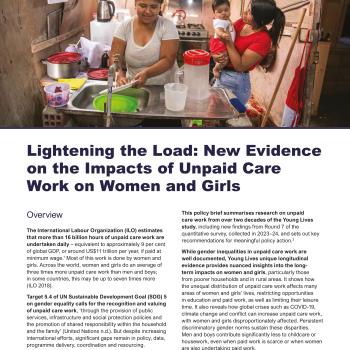
This latest policy brief from Young Lives summarises research on unpaid care work from over two decades of the study, including new findings from Round 7 of the quantitative survey, collected in 2023–24, and sets out ways that policy can lighten the load.
Gender inequalities in unpaid care work are well documented, and Young Lives latest survey shows that women aged 29 are doing at least 4.5 hours more unpaid care work per day than men. Our unique longitudinal evidence reveals how this unequal distribution of unpaid care work has long-term impacts on many aspects of women and girls' lives, restricting opportunities in education and paid work, as well as limiting their leisure time. Young Lives evidence also shows how crises, such as COVID-19, climate change and conflict can increase unpaid care work, with women and girls disproportionately affected.
Young men today are doing more care work than they used to, but overall they continue to contribute significantly less to childcare or housework, even when paid work is scarce or when women are also undertaking paid work. The authors put forward a series of policy recommendations and argue that an evidence-based approach is required to ensure that unpaid care work receives the recognition it deserves as a social investment, a public good and a major factor in promoting gender equality.

This latest policy brief from Young Lives summarises research on unpaid care work from over two decades of the study, including new findings from Round 7 of the quantitative survey, collected in 2023–24, and sets out ways that policy can lighten the load.
Gender inequalities in unpaid care work are well documented, and Young Lives latest survey shows that women aged 29 are doing at least 4.5 hours more unpaid care work per day than men. Our unique longitudinal evidence reveals how this unequal distribution of unpaid care work has long-term impacts on many aspects of women and girls' lives, restricting opportunities in education and paid work, as well as limiting their leisure time. Young Lives evidence also shows how crises, such as COVID-19, climate change and conflict can increase unpaid care work, with women and girls disproportionately affected.
Young men today are doing more care work than they used to, but overall they continue to contribute significantly less to childcare or housework, even when paid work is scarce or when women are also undertaking paid work. The authors put forward a series of policy recommendations and argue that an evidence-based approach is required to ensure that unpaid care work receives the recognition it deserves as a social investment, a public good and a major factor in promoting gender equality.

